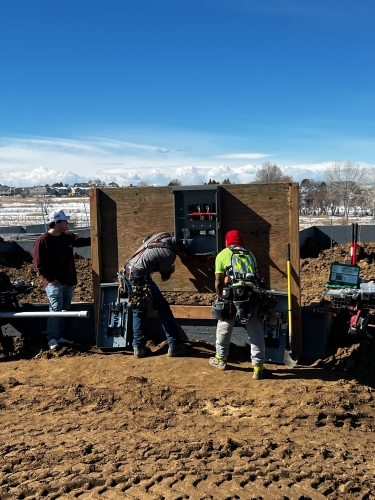Electric Panel Upgrade in Boulder, CO
Electric panel upgrades in Boulder, CO improve safety and reliability by increasing capacity for EV chargers, heat pumps, solar, and advanced appliances. This summary explains how a professional load calculation sizes the service and panels, outlines typical upgrade paths such as increasing from 100A to 200A or installing a 200A main with subpanels for solar and EV, and details the replacement process, permits, and utility coordination. It also covers surge protection, warranties, financing options, and ongoing maintenance to keep a code-compliant, future-ready system.

Electric Panel Upgrade in Boulder, CO
An electric panel upgrade is one of the most important safety and performance improvements you can make to a Boulder home. Older panels and undersized service can cause frequent breaker trips, limit new appliance or EV charger installations, and increase fire risk. In Boulder, CO, where many homes are older and owners increasingly add electric vehicles, heat pumps, and solar PV, upgrading your service capacity and modernizing the panel ensures reliable power, better safety, and compliance with local electrical codes.
Signs you need an Electric Panel Upgrade in Boulder, CO
Recognizing the need for an upgrade helps avoid inconvenient outages and potential hazards. Common signs in Boulder homes include:
- Frequent breaker trips or nuisance tripping when running multiple appliances
- Flickering or dimming lights when major appliances kick on
- Reliance on multiple extension cords or power strips to supply permanent appliances
- Old or corroded panel equipment, rust, burning smell, or scorch marks
- Limited breaker spaces preventing safe addition of new circuits (EV charger, hot tub, home workshop)
- Homes with still-active fuse boxes, 60A or 100A services that were standard decades ago
- Renovations, finished basements, or added high-draw equipment (electric vehicle chargers, induction ranges, heat pumps)
- Presence of legacy or known-unsafe panels (e.g., very old brands or damaged breakers)
Benefits of upgrading your panel in Boulder
Upgrading your electrical panel brings several tangible benefits suited to Boulder living:
- Increased capacity to support EV chargers, heat pumps, and kitchen or workshop loads
- Improved safety through modern breakers, proper grounding, and better connection hardware
- Support for solar PV systems and battery storage with appropriate main breaker and interconnection space
- Reduced nuisance trips and more consistent voltage during cold snaps or peak demand
- Lower risk of electrical fires associated with aging equipment
- Better home resale value and peace of mind with updated, code-compliant service
Load calculation and panel selection for Boulder homes
A professional load calculation determines the correct service size and panel configuration for your home:
- Load calculation considers permanent appliances, HVAC systems, future plans (EV charger, shop equipment), and diversity factors per NEC and local amendments.
- Common upgrade moves in Boulder are from 100A to 200A service; some homes moving to electrification or adding solar/EV capability may need 400A or a 200A main with subpanels.
- Panel selection balances required amperage, number of breaker spaces, available real estate, and integration with surge protection or space for future battery/solar connections.
- Local conditions—high altitude, wide temperature swings, and strong solar adoption—mean coordination for solar-ready panels or combined disconnects is often desirable.
Electric panel replacement process in Boulder homes
A typical, professional panel replacement follows a clear, code-driven sequence:
- Initial assessment and load calculation to size the new service and identify required upgrades (grounding, service conductors, meter base).
- Permit application and scheduling with the local jurisdiction (City of Boulder or county) and notifying the utility (most often Xcel Energy) when a service disconnect or meter work is required.
- Procurement of the correctly sized panel, breakers, grounding equipment, and any necessary meter equipment or meter socket.
- On-site replacement: de-energizing service with the utility, removing the old panel, installing the new service equipment, upgrading grounding/bonding, re-terminating circuits, and testing breakers and wiring.
- Professional inspection and final utility reconnection after the electrical inspector approves the work.
- Final testing, labeling of circuits, and documentation of warranty and equipment details.
Permits, inspections, and utility coordination in Boulder
Permits and inspections are a required part of safe, legal electrical upgrades:
- Boulder and surrounding jurisdictions require electrical permits and inspector approval for service changes. Work without a permit can lead to insurance and resale complications.
- Utility coordination (typically with Xcel Energy in Boulder) is necessary for disconnecting the service, changing meter equipment, or swapping a service drop. The utility may charge fees and set appointment windows.
- Licensed electricians manage permit paperwork, schedule inspections, and handle utility coordination to ensure the process meets local code and interconnection requirements for PV or battery systems.
Timeline and cost considerations
Timing and cost depend on scope and complexity:
- Typical timeline: assessment and permit pull (a few days to 2 weeks depending on permit backlog), replacement work (most standard upgrades are completed in 1 to 2 days), followed by inspection scheduling (a few days).
- Cost variables include service amperage (100A vs 200A vs larger), panel brand and number of circuits, need to replace service entrance cable or meter base, grounding upgrades, and whether meter or utility work is required.
- Additional costs can arise from bringing aged wiring up to modern code, adding subpanels, trenching for underground service, or integrating solar/battery equipment.
Surge protection and warranty options
Protecting your upgraded system preserves electronics and extends equipment life:
- Whole-home surge protection installed at the main panel prevents damaging transient voltage from entering the house and is recommended in Boulder where weather-related surges and lightning are possible.
- Point-of-use surge devices provide supplemental protection for sensitive electronics.
- Manufacturer warranties for panels and breakers vary; workmanship warranties from the installing electrician cover installation-related issues. Collect and retain warranty documentation for both equipment and labor.
Financing choices for electrical panel upgrades in Boulder
Several financing options make upgrades more affordable:
- Home improvement loans or personal lines of credit
- Contractor-sponsored financing or payment plans through third-party lenders
- Energy-efficiency financing or incentives when paired with solar or heat pump installations (availability varies; check local programs)
- Spreading the investment over time can be practical for homeowners adding EV chargers, solar interconnection, or preparing a home for electrification
Long-term benefits and maintenance
An upgraded panel is a long-term investment in safety, comfort, and home value:
- Regular maintenance includes visual inspections, ensuring labels remain accurate, and having a licensed electrician test connections if you suspect issues.
- Modern panels reduce fire risk, accommodate future technologies, and simplify adding new circuits as lifestyles change.
- For Boulder homeowners planning EV charging, solar installation, or home electrification, a properly sized, code-compliant service is essential to avoid costly retrofits later.
Upgrading your electric panel in Boulder, CO aligns your home with modern electrical demands, local safety standards, and the region’s growing shift to electrification and renewable energy. A thorough load calculation, proper permits, utility coordination, and surge protection will ensure a safe, reliable, and future-ready electrical system for your home.

















